Microsoft Pushes Copilot AI in Bing Search Results, Raising Concerns Over Competitive Practices
7 Sources
7 Sources
[1]
If you thought Microsoft's Edge marketing was invasive, just wait until you see Copilot's
* Microsoft pushing Copilot by adding it to rival AI assistant searches on Bing. * Widget titled "Your Copilot is here" appears at the top of search results. * Bing injects the Copilot widget regardless of the browser used, part of Microsoft's strategy to promote Copilot. It's no secret that Microsoft is a little persuasive when it comes to advertising its browser, Edge. If you've ever installed a new Windows system and used Edge to search for and download a new browser, you'll quickly notice all the warning signs begging you to stick with Microsoft's browser instead. This gets even more intense if you try to download Chrome, with Microsoft pestering you every step of the way. While that has been the norm for a few years now, Microsoft has found a new golden goose: Copilot. With the company funneling a ton of money into its AI assistant and axing jobs to make room for it, it really wants more people using Copilot, and fast. So, if you're using Bing and you dare enter the name of a rival AI company into it, be ready to face the consequences. Microsoft begins adding Copilot to the top of rival AI assistant searches As spotted by Windows Latest, something strange is reportedly happening when you search for services such as ChatGPT or Google Gemini using Bing. On the search results page, instead of seeing the proper website at the top of the results, you'll see a little widget titled "Your Copilot is here." It comes with a description that reads "Effortlessly ask questions, generate images, and handle tasks with Copilot, your reliable companion." It then provides you with a little box to ask stuff in. If you use the box to enter your query, you'll be whisked off to using Copilot, with Microsoft hoping that you'll find whatever it was you were pulling up ChatGPT for. And Windows Latest notes that Bing injects the widget, not Microsoft Edge, so you should see this pop-up regardless of which browser you use. This isn't the first time we've seen Microsoft try to divert people toward its products with Bing. Back in January of this year, we saw Bing responding to people searching for "Google" by presenting a unique widget that has the same look and feel as Google, down to a doodle-like graphic. Of course, entering anything into this faux-Google would pass it onto Bing instead. And if you think these tricks are pretty sneaky, I have a nasty feeling that it won't be the last, as Microsoft tries to get people using Copilot to justify its huge spending. If you want to see how else Microsoft is trying to win people over to use Copilot, you should see how it recently gave its AI assistant a face.
[2]
Searching for ChatGPT? Bing begs you to use Copilot instead
Microsoft's pleas and ads for you to use its services have now migrated to AI and its Copilot tools. Stop us if you've heard this before: Microsoft encourages you not to visit its competition. The latest category? AI. You may have noticed that if you visit Bing.com and then search for Google, Microsoft might remind you that it too has a search engine. More recently, Microsoft is now encouraging you to remain within its ecosystem and use Copilot instead of venturing elsewhere to Google, OpenAI, or Meta. When searching for "Claude" within Microsoft Edge -- I use Edge with Bing set at its search engine -- I tried looking up "Claude," the AI tool developed by Anthropic. While Bing dutifully returned the link as well as related information, it also reminded me that "Your Copilot is here," accompanied with a Copilot-specific search box. Windows Latest found that those banners are injected by Bing.com, rather than Edge itself. At this point, I basically expect Microsoft to virtually shout, Wait, wait, don't go! before I wander off its digital property. We can see evidence that, collectively, Microsoft's tactics are working. Last week, Microsoft reported results for its fiscal fourth quarter. Those results included a 21 percent boost in search and news advertising revenue excluding traffic acquisition costs, which is a substantial increase from last year. Microsoft doesn't really break out how that number into various growth drivers, but we can assume that every little bit counts: ads within Copilot, search ads themselves, widgets, and more. It's also worth remembering that while OpenAI's ChatGPT is crushing the competition in terms of user session traffic, Copilot made a surprising surge into second place around May. While that may be due to some inconsistencies in the tracking numbers, it's also possible that Microsoft's integration of Copilot into Windows plus various tactics to try and keep them there -- like this! -- are paying off. It's just hard to say whether Microsoft's fooling people into using it, however, or convincing them to stay.
[3]
Microsoft's up to its old tricks, this time pushing Copilot AI in your face when searching on Bing - and this is getting tiresome
A Copilot banner appears at the top of the results, and it's easy for users to mistakenly use that instead of the AI they were really looking for Microsoft is up to some sneaky tricks again in terms of promoting its own services, and this time it's Copilot AI, which is now being pushed on those using Bing search. As Windows Latest reports, if you go to Bing.com and search for a major AI service that rivals Microsoft's own Copilot - meaning ChatGPT, Google's Gemini, or Claude AI - you'll get a Copilot banner popping up. This appears right at the top of the search, announcing that 'Your Copilot is here' and offering a prompt to ask Microsoft's AI 'anything'. You can then type a query in the presented box if you want, and it'll open up the Copilot website with the results. This behavior is implemented via the Bing search site itself, so it'll happen if you go to Bing.com in any web browser (not just Edge). While the Copilot banner that Bing search serves up is labelled as 'Promoted by Microsoft', the company has chosen a very small font for that particular detail, so it's easy enough to miss. In fact, the way the search result is laid out in this scenario is quite deceptive in a few aspects. So, say you search for ChatGPT in Bing, the ChatGPT website is the top result (as you'd expect, of course), but the way the Copilot banner is perched right above it could trick you into thinking the query box is actually for ChatGPT. Some people might not realize that and then end up redirected to the Copilot website with their query, which is clearly the idea. If the Copilot banner was presented to the side, for example - out of the way - this would be much less likely to happen. Furthermore, if you leave the tab with the Bing search for ChatGPT (or the other mentioned AI services), and then return to it, the Copilot banner is actually highlighted in bright white, with the rest of the results greyed out. The banner is effectively spotlighted - check out the above screenshot to see what I mean - so people are even more likely to be drawn to it, especially if they aren't tech-savvy and don't really look at the page properly. All in all, this feels like a bit of unwelcome duplicity, but in truth, it's nothing new for Microsoft - or other tech giants, for that matter. Microsoft is particularly keen on prompting folks to use its Edge browser in one way or another, including if you try to download Chrome. Indeed, searching for Chrome in Bing.com results in a very similar 'Promoted by Microsoft' banner at the top of the results (and we've seen even shadier moves than this in the past). And yes, Google pulls this sort of chicanery as well, and if you head to Google.com you'll be prompted to make use of its AI, Gemini, with a pop-up. That said, if you search for 'Copilot' on Google, you won't get Gemini inserted into the search results in the same way Microsoft does with Copilot in Bing. At any rate, while it's very unlikely this kind of promotional nonsense will ever go away, it's disappointing to see a somewhat more blatant example from Microsoft here - particularly in the highlighting of the Copilot query box, should you flick away from the active tab, and then switch back.
[4]
Microsoft is pushing Copilot on Bing users, report says
Users who search for the likes of Open AI's ChatGPT, Google's Gemini, or Anthropic's Claude will see Copilot banners popping up, prompting users to ask Microsoft's AI service their queries and later opening the Copilot website with results. The banner reads "Your Copilot is here." The results for Copilot are prominent, displayed right at the top of the search results of AI competitors. "Effortlessly ask questions, generate images, and handle tasks with Copilot, your reliable companion," reads the result on Bing.com. And per Windows Latest, the Copilot promotion is subtly labeled as an advertisement, with fine print that reads, "promoted by Microsoft." Microsoft isn't alone in leading users to its own AI. Google, for example, similarly promotes Gemini and AI search on its platform via pop-ups. Microsoft recently entered the AI browser space, introducing Copilot Mode in Microsoft Edge, its AI-powered browser.
[5]
Bing's latest 'just doing Bing things': Searching for certain AI models in Microsoft's Edge browser earns you a plea to use Copilot
Bing doing Bing things: It doesn't do a great job of promoting Copilot, though. I must confess to having a bit of a soft spot for Bing, Microsoft's search engine. Not because it's good (it isn't) and not because there are no alternatives (there are). It's all down to how hard it tries to be relevant or remind you about other products from Redmond. To coin a phrase from a great game, it keeps on keeping on. And now it's trying its best to do the same thing for Copilot, Microsoft's seemingly everywhere AI. Word of this was reported by Windows Latest, and having just reinstalled Windows on my main PC without touching Edge, I fired it up and typed in a Bing search for ChatGPT (after wading through countless setup windows, of course). And yep, there it is: a reminder that "Your Copilot is here" and with it, you can "Effortlessly ask questions, generate images, and handle tasks." I tried searching for Claude and Gemini and got the same Copilot-first result. However, doing the same for GPT-4, DALL-E, and Llama gave me the direct links to the first two and the Wikipedia page for an ungainly-looking, spit-toting mammal for the last one. Perhaps Bing doesn't rate those as being competition for Copilot? While I'm sure that this all comes across as me having a bit of dislike for Copilot, I'm actually completely ambivalent about it. I have no issue with it pervading throughout Windows and its applications, and other Microsoft products, because I can easily ignore or disable it. If I want to use it, then the option is always there, at least. However, I'm a bit puzzled as to why Microsoft added a Copilot prompt bar when you've Bing-searched for a specific term. If the software giant is so keen on us all using it, why not just always have it there? It would certainly be very easy to do. I installed a few other browsers and set the default search engines to Bing in those, and the Copilot plug still pops up, so it's clearly integrated into Bing webpages rather than being proprietary to Edge. I'm also puzzled as to why Microsoft hasn't done a Google and made Copilot AI stuff the default search response from Bing. Let me just clarify that I don't want it to do this because Google's AI summaries are often awful, but from a marketing perspective, you couldn't ask for a better way to showcase all your AI efforts in front of millions of users every day. Bing's half-hearted attempt at promoting Copilot seems contrary to Microsoft's otherwise invasive integration. I'd expect to see Copilot being promoted or the prompt bar displayed on every Bing search result, not just a handful related to certain AI models. Heck, even Copilot itself offers a better summary of how to do it all properly. Look, I'm just a poor hardware writer, not a multi-billion-dollar software company, and I clearly know nothing, but perhaps Microsoft might want to use its own tools to figure out how to market them better?
[6]
Microsoft Is Trying to Trick You Into Using Copilot
There are a ton of AI products out there to choose from today, but it's pretty clear who the big players are. There's Google's Gemini, with its 400 million monthly users, which sounds like a lot, until you learn ChatGPT nets 700 million users every week. That's really no match for even Microsoft, whose AI assistant Copilot garners a humble 20 million weekly users. That's a lot of people, mind you, but if you're Microsoft, you might be thinking of ways to pull in some of that traffic from OpenAI and Google -- even if Microsoft is a major partner of OpenAI's. That appears to be exactly what Microsoft is doing. If you use Microsoft's search engine, Bing, you'll find many different options for interacting with Copilot. You can click the big Copilot button next to the search bar, or deal with the enormous "Copilot Answer" that appears at the top of any given search result, à la AI Overviews. But if you try to use Bing to search for another AI product altogether, like ChatGPT or Gemini, that Copilot Answer is replaced by something else entirely: Copilot itself. Give it a try. So long as Microsoft hasn't updated Bing since I published this piece, a search for one of these AI competitors will result in the following: You'll see "Promoted by Microsoft: Your Copilot is here," encouraging you to "effortlessly ask questions, generate images, and handle tasks with Copilot, your reliable companion." Below that, a large interactive search bar, which reads, "Ask me anything." Indeed, you can enter a query in this field, his return, and find yourself in a new Copilot window. (Curiously, searching or Anthropic or its AI product, Claude, does not trigger this Copilot experience. Sorry, Anthropic.) Look, Bing is a Microsoft product, so of course the company would rather direct you to its own services than point you towards the thing you're actually looking for. In fact, the same thing happens when you search Bing for a non-Microsoft web browser, like Chrome -- Bing's first "result" is instead a plea to "try the latest browser from Microsoft," with a convenient link to launch Edge. For me, however, this latest tactic blurs the lines a bit between encouragement and trickery. I think if you are searching for one web browser, and Microsoft offers you a link to another, it's fairly obvious you're choosing between those two programs. However, I can see how it might be confusing for someone looking for ChatGPT on Bing to see a search bar appear right away, with an encouraging message to get started then and there -- especially if they don't know what Copilot is. It wouldn't the first time Microsoft tried to trick people into using their products. At the start of this year, the company spoofed Google's homepage whenever someone used Bing to search for Google. To the untrained eye, you might think you landed on Google already, as the top half of the window looked very much like the iconic search engine. It was only after looking at the bottom half that it became clear this was still a search result on Bing's site, not Google's. How many people were tricked into using Bing when they thought they were using the search engine they were looking for? Fast forward to August, and I now wonder how many people are going to use Copilot because they thought they had made it to ChatGPT or Gemini. In my humble opinion, if you're going to build a search engine, it should primarily point people towards the content they're looking for. Using your search engine as a vehicle to trick people into using your other services is dishonest, and, frankly, sad.
[7]
Bing promotes Copilot over ChatGPT and Claude
Microsoft is actively promoting its Copilot AI to Bing users who search for competing AI chatbots, as reported by Windows Latest. This initiative directs users towards Microsoft's AI service through prominent banners and search result placements. When users search for rival AI chatbots such as OpenAI's ChatGPT, Google's Gemini, or Anthropic's Claude, Copilot banners appear. These banners prompt users with the message, "Your Copilot is here," encouraging them to utilize Microsoft's AI. Clicking these banners subsequently opens the Copilot website, displaying the relevant results for the user's query. The display of Copilot results is notably prominent, positioned at the very top of the search results for these AI competitors. The associated text on Bing.com states, "Effortlessly ask questions, generate images, and handle tasks with Copilot, your reliable companion." According to Windows Latest, this Copilot promotion is labeled as an advertisement, indicated by fine print that reads, "promoted by Microsoft." Google also employs similar tactics, promoting its Gemini AI and AI search features on its platform through pop-ups. Microsoft recently expanded its AI offerings by introducing Copilot Mode within Microsoft Edge, its AI-powered browser.
Share
Share
Copy Link
Microsoft is promoting its Copilot AI assistant by displaying a prominent banner in Bing search results when users search for competing AI services, sparking debate about the company's marketing tactics.
Microsoft's New Tactic to Promote Copilot
Microsoft has implemented a new strategy to promote its Copilot AI assistant, raising eyebrows in the tech community. When users search for competing AI services like ChatGPT, Google's Gemini, or Anthropic's Claude on Bing, they are now presented with a prominent banner promoting Copilot
1
.The Copilot Banner
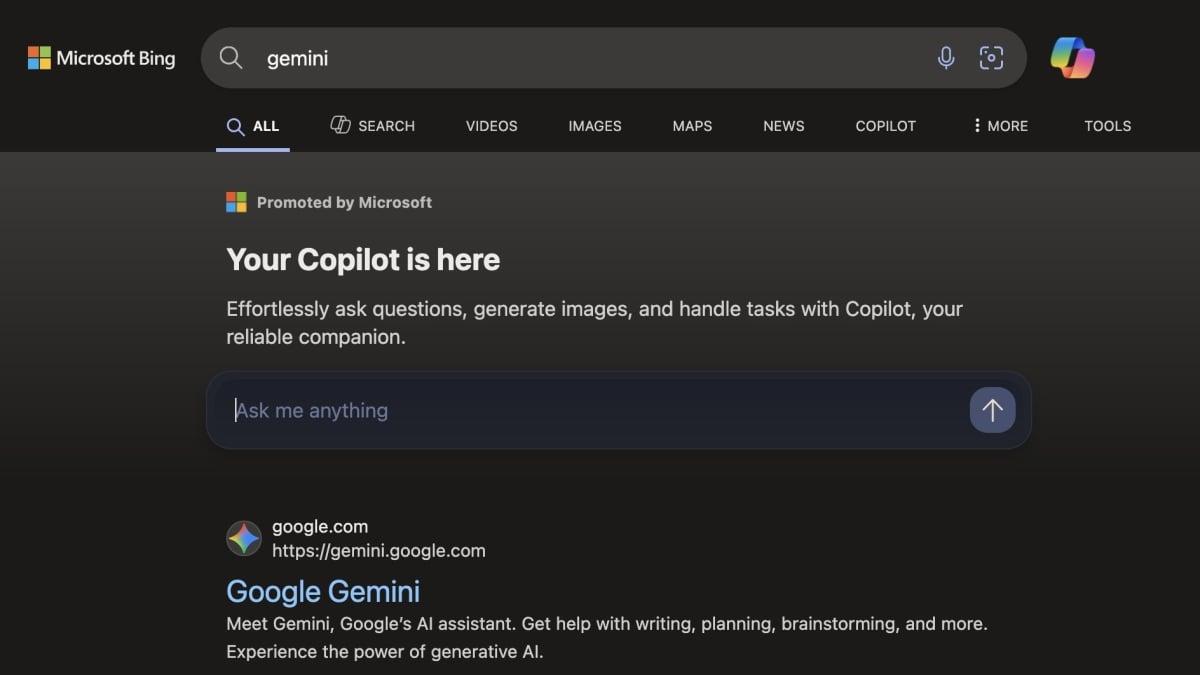
Source: Lifehacker
The banner, which appears at the top of search results, is titled "Your Copilot is here" and includes a description that reads, "Effortlessly ask questions, generate images, and handle tasks with Copilot, your reliable companion"
2
. It also provides a query box for users to interact directly with Copilot.Implementation and Reach
This feature is implemented through Bing.com itself, not just Microsoft Edge, meaning users will encounter it regardless of the browser they use
3
. While the banner is labeled as "Promoted by Microsoft," the font is notably small, making it easy to overlook.Potential for User Confusion
The placement and design of the Copilot banner have raised concerns about potential user confusion. Its position directly above the actual search results could lead some users to mistake it for the service they were originally searching for
3
. This effect is amplified when users return to the tab, as the Copilot banner is highlighted while other results are greyed out.Microsoft's AI Push
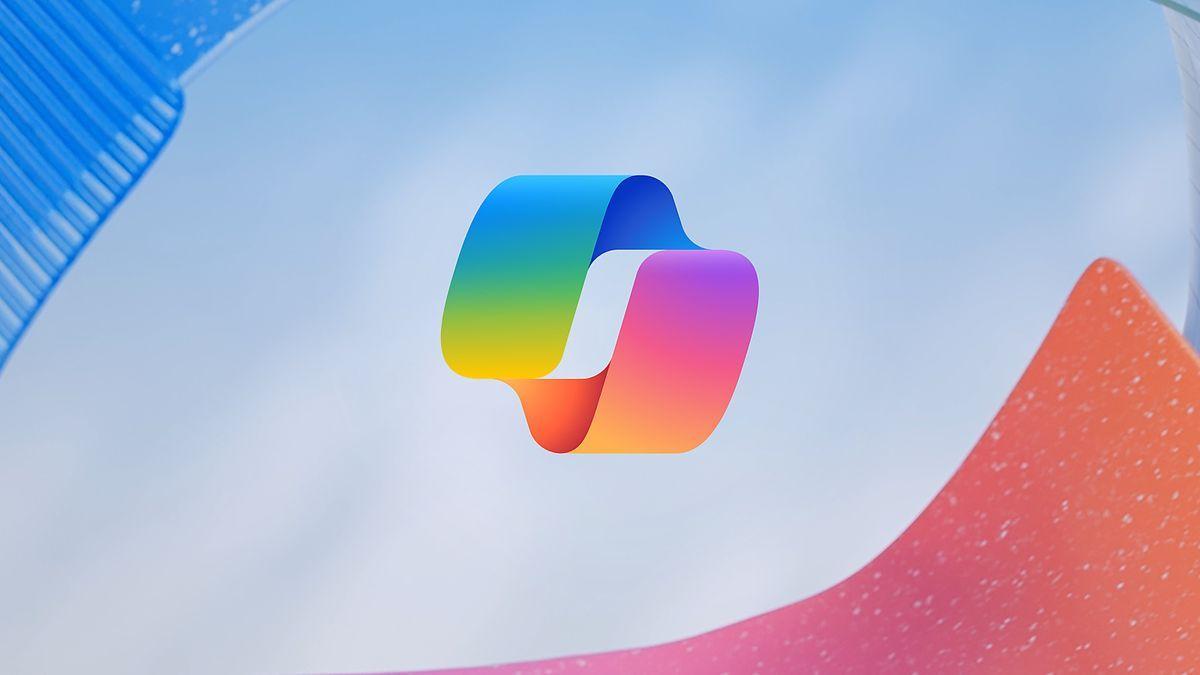
Source: PC Gamer
This move is seen as part of Microsoft's broader strategy to promote its AI services. The company has been investing heavily in Copilot, even restructuring its workforce to accommodate this focus
1
. The promotion of Copilot in Bing search results is reminiscent of Microsoft's past tactics to encourage users to stick with its Edge browser.Related Stories
Industry Context and Reactions
While Microsoft's approach has been criticized by some as aggressive or misleading, it's worth noting that such promotional tactics are not uncommon in the tech industry. Google, for instance, also promotes its Gemini AI through pop-ups on its search page
4
.Impact on User Experience and Competition
The introduction of the Copilot banner in Bing search results raises questions about the balance between product promotion and user experience. Some critics argue that this approach could potentially stifle competition by diverting users from other AI services they were initially seeking
5
.Microsoft's Strategy and Future Implications
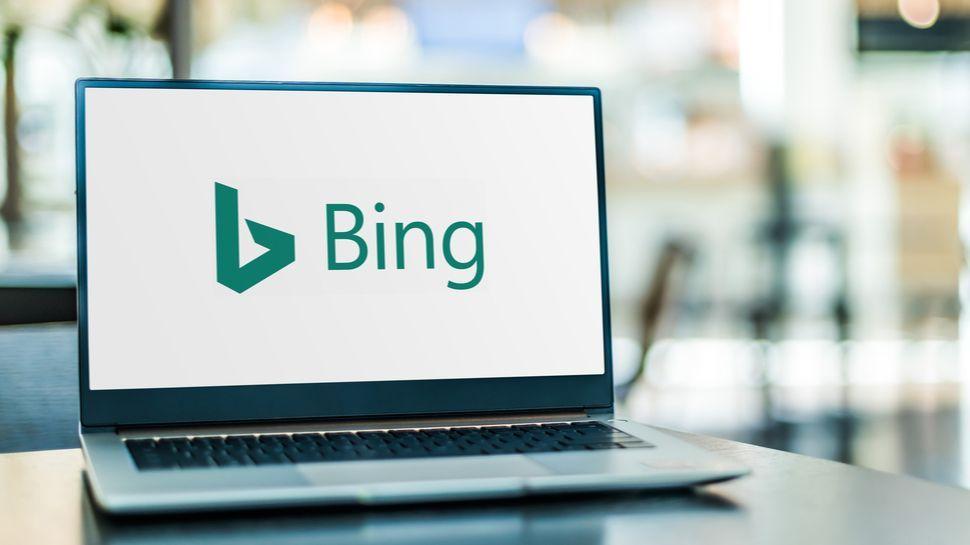
Source: TechRadar
As Microsoft continues to integrate Copilot across its products, including Windows and various applications, this latest move in Bing search results signals the company's determination to establish a strong presence in the AI market. The effectiveness and reception of these tactics may shape future strategies in the competitive landscape of AI assistants.
References
Summarized by
Navi
[1]
Related Stories
Microsoft's Controversial Tactics: Promoting Copilot Over Rival AI Services in Bing Search Results
06 Mar 2025•Technology

Microsoft Edge's New Tactic: Nudging Users Towards Copilot AI
21 Oct 2025•Technology
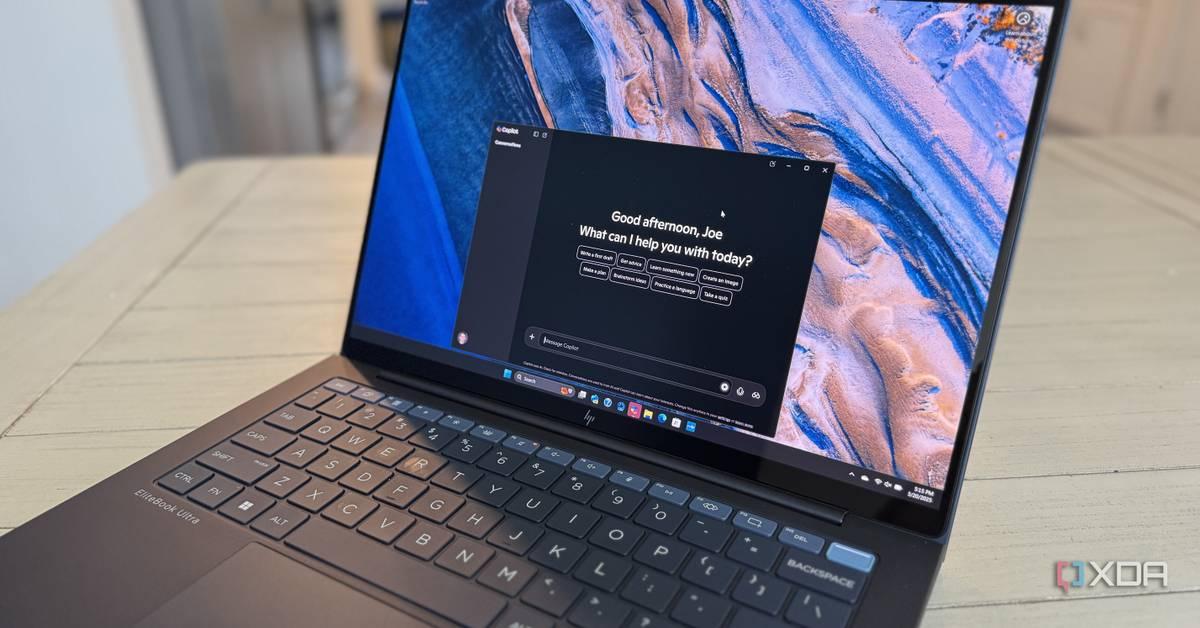
Microsoft Launches Copilot Search: A New AI-Powered Search Experience in Bing
03 Apr 2025•Technology
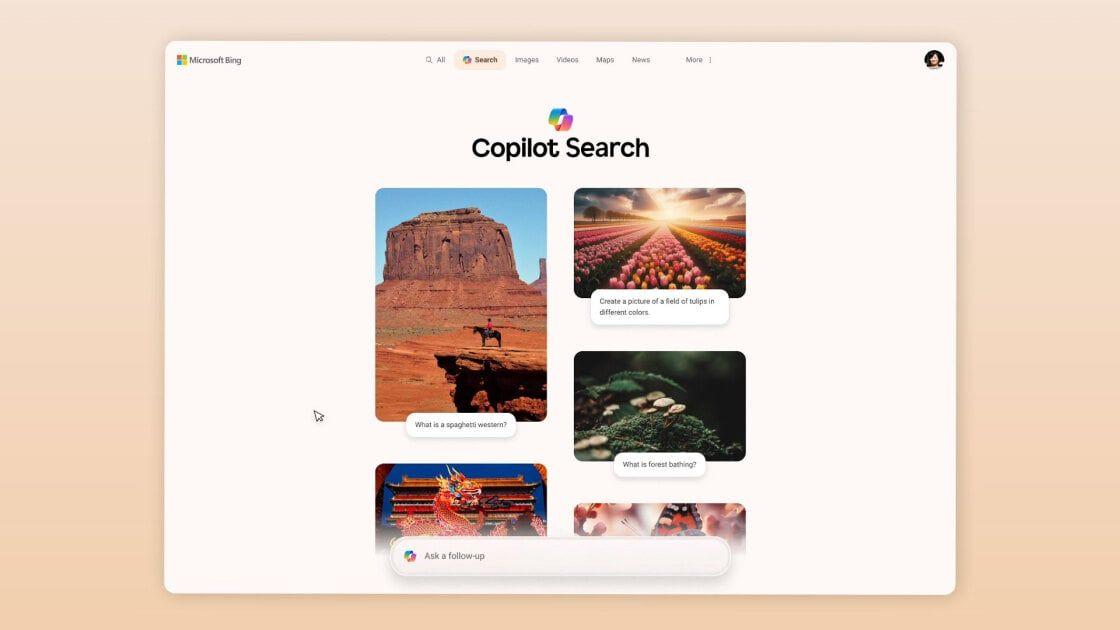
Recent Highlights
1
Google Gemini 3.1 Pro doubles reasoning score, beats rivals in key AI benchmarks
Technology

2
Meta strikes up to $100 billion AI chips deal with AMD, could acquire 10% stake in chipmaker
Technology

3
Pentagon threatens Anthropic with supply chain risk label over AI safeguards for military use
Policy and Regulation





